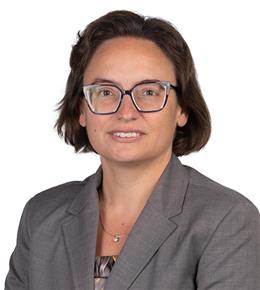
Contact Us
Hannah Haksgaard (nee Alsgaard) was born in Kentucky, but grew up outside of Yankton, South Dakota, where she received her K-12 education. She returned to Kentucky for college before attending law school in California. During law school, Professor Haksgaard was an editor on the Berkeley Journal of Gender, Law & Justice and was a graduate student instructor in the Berkeley Legal Studies department for two undergraduate classes: Government & the Family and Reproduction, Sex & the Law. Following law school, Professor Haksgaard clerked for the Honorable Roberto Lange of the District of South Dakota and the Honorable Kermit Bye of the Eighth Circuit Court of Appeals. Professor Haksgaard joined the USD Knudson Law faculty in 2016.
Professor Haksgaard currently teaches Property, Family Law, Modern Real Estate Transactions, and Reproduction & the Law. She previously taught Employment Discrimination. At the law school Professor Haksgaard also advises the South Dakota Law Review, the Family Law and Children's Advocacy, and the American Constitution Society.
In addition to her law school teaching and advising, Professor Haksgaard is affiliated faculty with the University of South Dakota Gender, Women and Sexuality Studies Department where she advises undergraduate research, including for students writing their honors thesis.
Professor Haksgaard has joined a small group of scholars who write about, and propose solutions for, the rural lawyer shortage. Her scholarship on the rural lawyer shortage has specifically addressed Project Rural Practice in South Dakota, how rural practice serves the public good, the impact of hourly rates for court appointment work, and how incentive programs for rural lawyers can be informed by incentive programs for rural medical professionals. Professor Haksgaard also writes about family law issues. Her scholarship in this area mainly focuses on how family status impacts the ownership of property. She has also written about surname choice at marriage and the impact of rurality in how women access reproductive healthcare.
